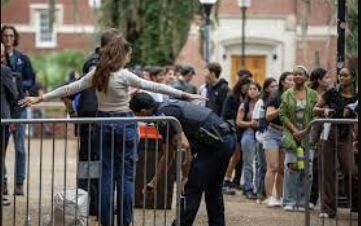University of Florida Pro-Palestinian Group Sues School and Governor, Alleging First Amendment Violations
A pro-Palestinian student group at the University of Florida is suing school leadership and Governor Ron DeSantis, alleging First Amendment rights violations. The lawsuit challenges the deactivation of the group and highlights tensions on college campuses over the Israel-Hamas war. The ACLU argues that the deactivation order violates free speech rights. This lawsuit, along with similar cases at other universities, raises concerns about censorship and the protection of students' free speech. Organizers hope this legal challenge will send a strong message against unconstitutional censorship in schools.
A pro-Palestinian student group at the University of Florida is suing school leadership and Governor Ron DeSantis, alleging that their First Amendment rights were violated. The lawsuit, filed by the University of Florida's Students for Justice in Palestine (SJP) and represented by the American Civil Liberties Union (ACLU), claims that the group was ordered to deactivate as punishment for a statement. Florida's State University System Chancellor, Ray Rodrigues, had written a letter to university presidents last month instructing them to deactivate SJP chapters.
The decision to deactivate the groups came after the national Students for Justice chapter released a toolkit that was seen as supporting the Hamas attack and violating a Florida statute. However, Rodrigues clarified that the groups were not deactivated since they are not under the national SJP. This lawsuit highlights the escalating tensions on college campuses across the US over the Israel-Hamas war, with universities cracking down on pro-Palestinian protests and students stepping up demonstrations. The ACLU argues that the deactivation order chills speech, fosters an atmosphere of mutual suspicion, and violates the First Amendment. They also state that local student group chapters cannot be punished for their association with separate national organizations.
This lawsuit is significant as it could set a precedent for silencing any organization that does not align with the ideals of Governor DeSantis. The lawsuit against Florida's ban on pro-Palestinian university groups has been filed in federal court, challenging the state's violation of students' free speech rights. The ACLU, ACLU of Florida, and Palestine Legal are seeking a preliminary injunction against the state order that blocked SJP from receiving school funds and using campus facilities. The lawsuit argues that students have the right to associate and speak out on matters of public concern, as affirmed by Supreme Court decisions. It also states that federal law does not criminalize independent political advocacy, as long as there is no coordination with foreign terrorist groups.
This lawsuit comes as other universities, such as Brandeis University, Columbia University, and George Washington University, have suspended or banned SJP chapters. The universities cite the national organization's support for the Hamas attack and violations of school policies. However, the student groups argue that the suspensions and bans are unjust. The dispute in Florida began with a "deactivation order" that accused the national SJP of supporting terrorism. The UF SJP insists that it is autonomous and not involved with the national group, and its response to the Hamas attack was to mourn the loss of innocent lives.
The lawsuit cites two Supreme Court precedents to oppose the deactivation order and argues that independent political advocacy is protected as free speech. The ACLU hopes that this legal challenge will send a strong message against unconstitutional censorship in schools. The issue of free speech on college campuses has become a contentious subject, with various groups calling for investigations and penalties against pro-Palestinian student groups. The ACLU and other organizations have urged colleges and universities to reject such calls and protect students' right to free speech.




